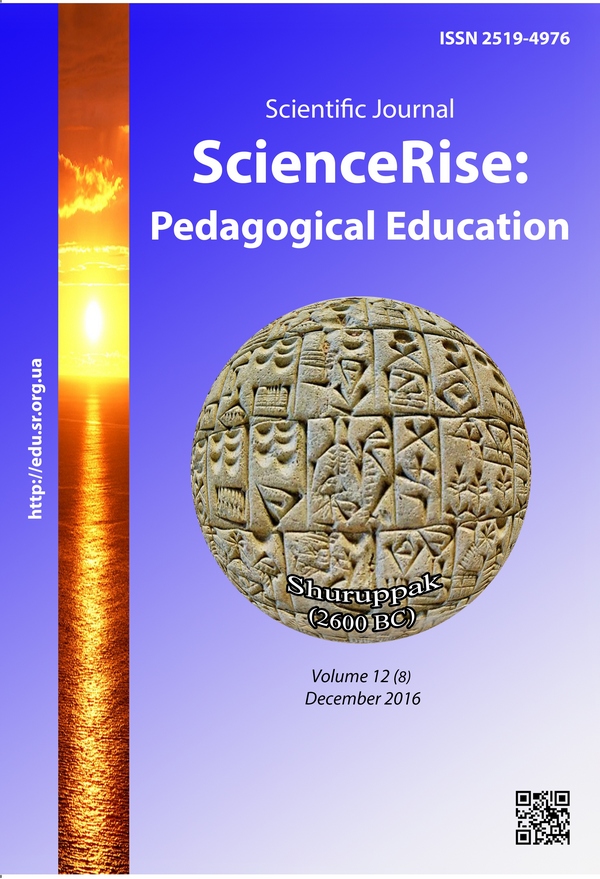Analisis of organizational and pedagogical features of future translator and interpreter training in the USA: key aspects
DOI:
https://doi.org/10.15587/2519-4984.2016.87998Keywords:
translator, interpreter, the USA, organizational and pedagogical features, training program, form of learning, teaching methodAbstract
In the article the organizational and pedagogical features of future translator and interpreter training in the US higher educational institutions have been researched. Educational programs in translation and interpretation are well represented in all states of the country and differ from each other due to the autonomy and independence of educational institutions in developing the training programs. The MA in Translation and Interpretation programs together with the master degree programs in field translation or interpretation prevail in the US colleges and universities. Lectures and class discussion are among the common forms of training. Teaching methods such as: discussion, simulation and immersion are widely used in the process of translator/interpreter training. Students are usually involved in the translation project activities. Training activities mostly include the assignments focused on the translation process, text analysis, development of thoughtful reading skills, formation of text corpora, and development of interpretation strategies according to the ethical code of conduct. The latest computer and information technology are usually used as the instruments both in the learning and teaching processes. The US students have wide choice of online and distance courses
References
- Bidyuk, N. M. (2015). Rozvytok systemy osvity doroslykh u SShA (druha polovyna XX – pochatok XXI stolittya) [Development of the Adult Education System in the USA (second part of the 20th – beginning of the 21st century)]. Pedagogical Sciences: Theory, History, Innovation Technologies, 1, 3–10. Available at: http://nbuv.gov.ua/UJRN/pednauk_2015_1_3
- Velushchak, M. Ya. (2015). Pidhotovka maybutnikh fakhivtsiv z mizhnarodnoho biznesu v universytetakh USA [Training of the Future Specialists in International Business at the U.S. Universities]. Khmelnytskyi, 308.
- Koshmanova, T. S. (2002). Rozvytok pedahohichnoyi osvity u USA (1960-2000 rr.) [Development of the teacher education in the USA (1960–2000 years)]. Kyiv, 589.
- Korniyenko, V. V. (2012). Profesiyna pidhotovka bakalavriv humanitarnykh nauk z prykladnoyi linhvistyky v universytetakh USA [Professional Training of Bachelors of Arts in Applied Linguistics at the US Universities]. Khmelnytskyi, 20.
- Mukan, N. V. (2010). Neperervna pedahohichna osvita vchyteliv zahal'noosvitnikh shkil. Profesiyne stanovlennya ta rozvytok (na materialakh Velykoyi Brytaniyi, Kanady, USA) [Continuing Education of Teachers of Secondary Schools. Teacher Professional Development in Great Britain, Canada, and the USA]. Lviv: Lvivska Poliyekhnika, 284.
- Romanovs'ka, O. O., Romanovs'ka, Yu. Yu., Romanovs'kyi, O. O. (2010). Osoblyvosti vyshchoyi osvity USA kintsya XX – pochatku XXI stolittya [Features of the US higher Education in the end of the 20th – beginning of the 21st century]. Vinnytsya: Nova knyha, 272.
- Tarasova, O. V. (2014). Profesiyna pidhotovka fakhivtsiv z mizhnarodnykh vidnosyn v universytetakh USA [Professional Training of International Relations Specialists at the U.S. Universities]. Khmelnytskyi, 20.
- Gouadec, D. (2007). Translation as a Profession. Benjamins Translation Library, 396. doi: 10.1075/btl.73
- Bowker, L. (2003). Towards a collaborative approach to corpus building in the translation classroom. American Translators Association Scholarly Monograph Series, 193–210. doi: 10.1075/ata.xii.14bow
- Gambier, Y. (2012). Teaching translation / Training translators. Handbook of Translation Studies, 163–171. doi: 10.1075/hts.3.tea1
- Colina, S. (2003). Towards an empirically-based translation pedagogy. American Translators Association Scholarly Monograph Series, 29–59. doi: 10.1075/ata.xii.04col
- Martynyuk, O. V. (2012). Profesiyna pidhotovka mahistriv tekhnichnoho perekladu v universytetakh USA [Professional Training of Masters of Arts in Technical Translation at the US Universities]. Khmelnytskyi, 20.
- Pym, A. (1994). Student exchange programmes and translator training: Three economic principles. Perspectives, 2 (1), 41–50. doi: 10.1080/0907676x.1994.9961221
- Albir, A. H. (2007). Competence-based Curriculum Design for Training Translators. The Interpreter and Translator Trainer, 1 (2), 163–195. doi: 10.1080/1750399x.2007.10798757
- Lavault-Olleon, E. (2007). Traduction specialisee. Pratiques, theories, formations. Bern: Peter Lang, 265.
- Center for Teaching Excellence. Teaching Roles: Lecturing. University of Kansas. Available at: https://cte.ku.edu/
- Delisle, J. (1992). Les manuels de traduction: essai de classification. TTR : Traduction, Terminologie, Redaction, 5 (1), 17–47. doi: 10.7202/037105ar
- Kearsley, G. (1984). Training and Technology. Massachusetts: Addison-Wesley, 187.
- Gonzáles Davies, M. (2004). Multiple Voices in the Translation Classroom. Amsterdam/Philadelphia: John Benjamins Publishing Company, 259.
- Gile, D. (2009). Basic Concepts and Models in Interpreter and Translator Training. Benjamins Translation Library, 283. doi: 10.1075/btl.8
- Gouadec, D. (2005). Traduction, localisation: Technologies et formation. Paris: Maison du Dictionnaire, 221.
- Kelly, D. (2008). Mobility programmes as a learning experience for translators students.Translator and Interpreter Training. Issues, Methods and Debates. London/New York: Continuum, 66–87.
- Yuste Rodrigo, E. (Ed.) (2008). Topics in Language Resources for Translation and Localisation. Benjamins Translation Library, 220. doi: 10.1075/btl.79
- Beeby, A., Rodriguez Ines, P., Sanchez-Gijon, P. (Eds.) (2009). Corpus Use and Translating. Benjamins Translation Library, 151. doi: 10.1075/btl.82
Downloads
Published
How to Cite
Issue
Section
License
Copyright (c) 2016 Катерина Миколаївна Скиба

This work is licensed under a Creative Commons Attribution 4.0 International License.
Our journal abides by the Creative Commons CC BY copyright rights and permissions for open access journals.
Authors, who are published in this journal, agree to the following conditions:
1. The authors reserve the right to authorship of the work and pass the first publication right of this work to the journal under the terms of a Creative Commons CC BY, which allows others to freely distribute the published research with the obligatory reference to the authors of the original work and the first publication of the work in this journal.
2. The authors have the right to conclude separate supplement agreements that relate to non-exclusive work distribution in the form in which it has been published by the journal (for example, to upload the work to the online storage of the journal or publish it as part of a monograph), provided that the reference to the first publication of the work in this journal is included.







